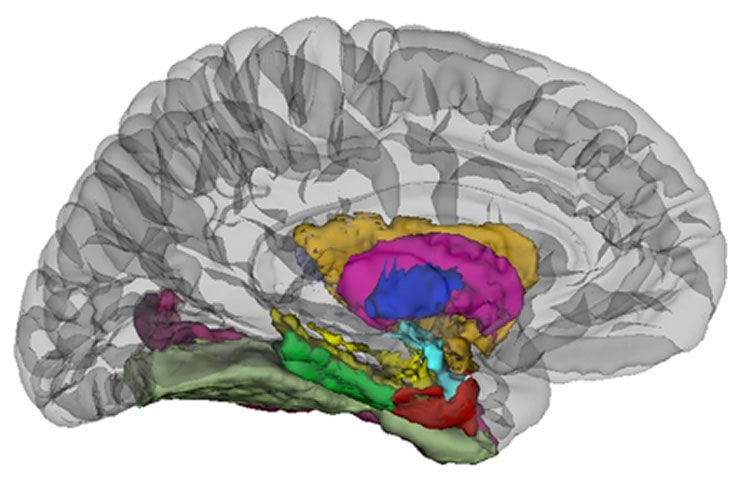Summary: A Neuroimaging study, conducted by King’s College London researchers, reveals accelerated brain aging during adulthood for those born very prematurely. Researchers noted those born preterm tended to have smaller global gray matter volume and some brain structure changes in areas associate with spatial abilities and behavior control in adulthood.
Source: King’s College London.
New King’s College London research suggests that babies born very prematurely show accelerated brain development in adult life, as their brains look ‘older’ compared to non-premature babies.
The final steps of brain development that are crucial for human brain function occur in the third decade of life, and this new study is the first to map out these changes in the very preterm brain over a 15-year period, from adolescence into adulthood. Very preterm is defined as birth 28-32 weeks before 37 weeks of pregnancy are completed.
Approximately 8 per cent of babies are born prematurely in the UK every year. Most premature babies go on to lead healthy lifestyles, although as a group they are more likely to require extra school support and experience a variety of psychiatric problems. This new study, published in the journal NeuroImage, sheds light on why people born prematurely experience these problems.
The researchers analysed data from 328 magnetic resonance imaging (MRI) scans of very preterm people who have been studied since birth, 232 MRI scans of control participants collected on-site and 1,210 scans obtained from open-access MRI depositories.
They found smaller global volumes of grey matter (which contains most of the brain’s neuronal cell bodies) in the very preterm group, and especially in areas involved in memory and in processing emotions. The study also revealed that some structural brain changes in areas responsible for complex cognitive operations, such as spatial abilities and behavioural control, are resilient to the effects of very preterm birth, possibly indicating the presence of compensatory mechanisms.

As grey matter volume changes over the life span, with an initial growth in volume up to adolescence followed by a steady decline, it can be used as a marker of ‘brain age’. The researchers found that in the premature group there was a discrepancy between participants’ chronological age and ‘brain age’ estimated from their MRI scan, suggesting that in participants of a similar age, very preterm adults’ brains looked ‘older’ than controls.
Dr Vjaceslavs Karolis, the study’s first author from King’s College London, said: ‘The finding of structural signatures of accelerated brain maturation in those born very prematurely was unexpected, because previous research suggested delayed brain maturation at earlier stages of development.’
Dr Chiara Nosarti, the study’s lead author, also from King’s, said: ‘It remains to be investigated whether these structural brain differences have real-life implications. Our results have clinical relevance as they could inform the development of cognitive and behavioural interventions aimed at boosting brain resilience.’
Funding: The study was funded by the Medical Research Council and supported by the National Institute for Health Research (NIHR) Maudsley Biomedical Research Centre.
Source: Jack Stonebridge – King’s College London
Image Source: NeuroscienceNews.com image is credited to the researchers.
Original Research: Full open access research for “Volumetric grey matter alterations in adolescents and adults born very preterm suggest accelerated brain maturation” by Vyacheslav R. Karolis, Sean Froudist-Walsh, Jasmin Kroll, Philip J. Brittain, Chieh-En Jane Tseng, Kie-Woo Nam, Antje A. T. S. Reinders, Robin M. Murray, Steven C. R. Williams, Paul M. Thompson, and Chiara Nosarti in NeuroImage. Published online September 20 2017 doi:10.1016/j.neuroimage.2017.09.039
[cbtabs][cbtab title=”MLA”]King’s College London “Premature Birth Linked to Older ‘Brain Age’ in Adulthood.” NeuroscienceNews. NeuroscienceNews, 25 September 2017.
<https://neurosciencenews.com/brain-age-preterm-babies-7571/>.[/cbtab][cbtab title=”APA”]King’s College London (2017, September 25). Premature Birth Linked to Older ‘Brain Age’ in Adulthood. NeuroscienceNews. Retrieved September 25, 2017 from https://neurosciencenews.com/brain-age-preterm-babies-7571/[/cbtab][cbtab title=”Chicago”]King’s College London “Premature Birth Linked to Older ‘Brain Age’ in Adulthood.” https://neurosciencenews.com/brain-age-preterm-babies-7571/ (accessed September 25, 2017).[/cbtab][/cbtabs]
Abstract
Volumetric grey matter alterations in adolescents and adults born very preterm suggest accelerated brain maturation
Previous research investigating structural neurodevelopmental alterations in individuals who were born very preterm demonstrated a complex pattern of grey matter changes that defy straightforward summary. Here we addressed this problem by characterising volumetric brain alterations in individuals who were born very preterm from adolescence to adulthood at three hierarchically related levels – global, modular and regional. We demarcated structural components that were either particularly resilient or vulnerable to the impact of very preterm birth. We showed that individuals who were born very preterm had smaller global grey matter volume compared to controls, with subcortical and medial temporal regions being particularly affected. Conversely, frontal and lateral parieto-temporal cortices were relatively resilient to the effects of very preterm birth, possibly indicating compensatory mechanisms. Exploratory analyses supported this hypothesis by showing a stronger association of lateral parieto-temporal volume with IQ in the very preterm group compared to controls. We then related these alterations to brain maturation processes. Very preterm individuals exhibited a higher maturation index compared to controls, indicating accelerated brain maturation and this was specifically associated with younger gestational age. We discuss how the findings of accelerated maturation might be reconciled with evidence of delayed maturation at earlier stages of development.
“Volumetric grey matter alterations in adolescents and adults born very preterm suggest accelerated brain maturation” by Vyacheslav R. Karolis, Sean Froudist-Walsh, Jasmin Kroll, Philip J. Brittain, Chieh-En Jane Tseng, Kie-Woo Nam, Antje A. T. S. Reinders, Robin M. Murray, Steven C. R. Williams, Paul M. Thompson, and Chiara Nosarti in NeuroImage. Published online September 20 2017 doi:10.1016/j.neuroimage.2017.09.039






